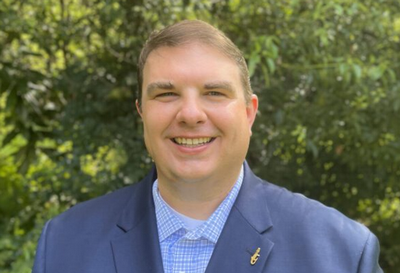
Steven Hall, a Samford University joint degree alumnus, is aiming to lead the revival of Florida’s citrus industry. As the new executive director of the Citrus Research and Field Trials (CRAFT) Foundation, Hall leads the development of sustainable solutions to combat threats that have crippled citrus farming—primarily, disease and severe storm damage.
Hall’s role at CRAFT pairs scientific exploration with practical application.
“Our mission is to transition research from the lab to the field, moving promising solutions into commercial-scale citrus groves and collecting data on the results,” said Hall, who earned his Juris Doctor and Master of Science in Environmental Management at Samford.
In only five years, CRAFT has invested around $85 million in citrus research, with the goal of restoring what was once a $7 billion annual industry in Florida.
Raised on a family farm in Malone, Florida, Hall has always connected to the land. After earning a degree in food and resource economics with an agricultural law minor from the University of Florida, he attended Samford, where he completed his graduate degrees.
“Samford’s training in advocacy skills and legal ethics has profoundly shaped my career,” Hall said. “The emphasis on practical, ethical decision-making in law has been a guiding principle in my work, especially in agriculture, where policy impacts both the environment and the economy.”
This background enabled Hall to work seamlessly with both policymakers and individual citrus growers, balancing governmental objectives with industry needs.
Hall’s career began at the Florida Department of Agriculture and Consumer Services, where he quickly advanced, spending over five years as general counsel before becoming assistant deputy commissioner of agriculture. Recognized for his contributions, he was named the 2018 Government Attorney of the Year by the Florida Government Bar Association, and in 2020, he earned a spot on the University of Florida’s “40 Gators Under 40” list of outstanding alumni.
With CRAFT, Hall’s goals include gathering data from the foundation’s projects to pinpoint real-world solutions for citrus production. Whereas Florida produced 240 million 90-pound boxes of oranges in 2004, current projections have dwindled to 15 million for this year. Hall views it as crucial to preserving open spaces and supporting local economies.
“Data-driven solutions are critical,” he said. “Our focus is not just to sustain, but to regain some of the citrus acreage that has been lost.”
While working to protect Florida’s citrus, Hall also leads his family’s sixth-generation farm in Jackson County, remaining deeply rooted within the agricultural community where he grew up. He and his wife, Tiffany, a veterinarian, live in Tallahassee with their two children.
